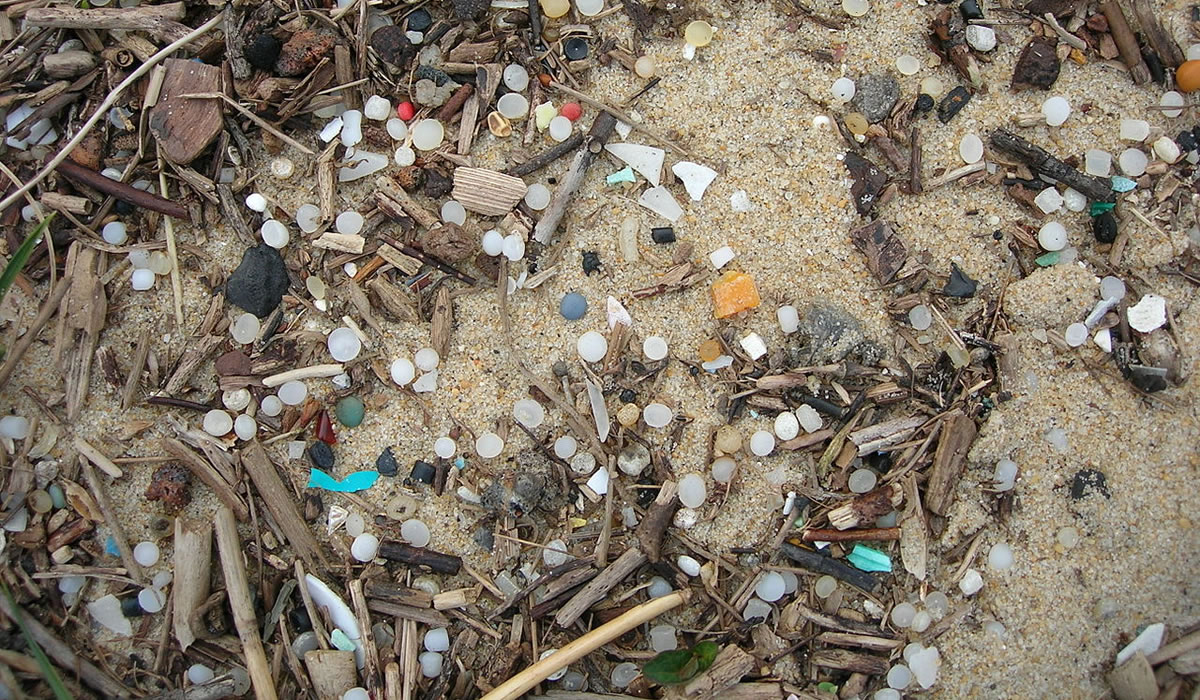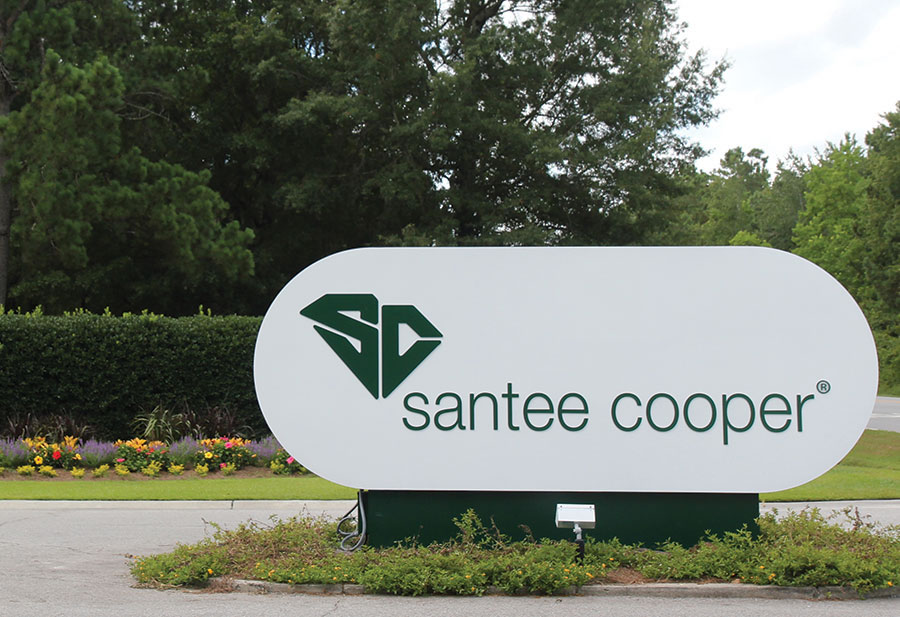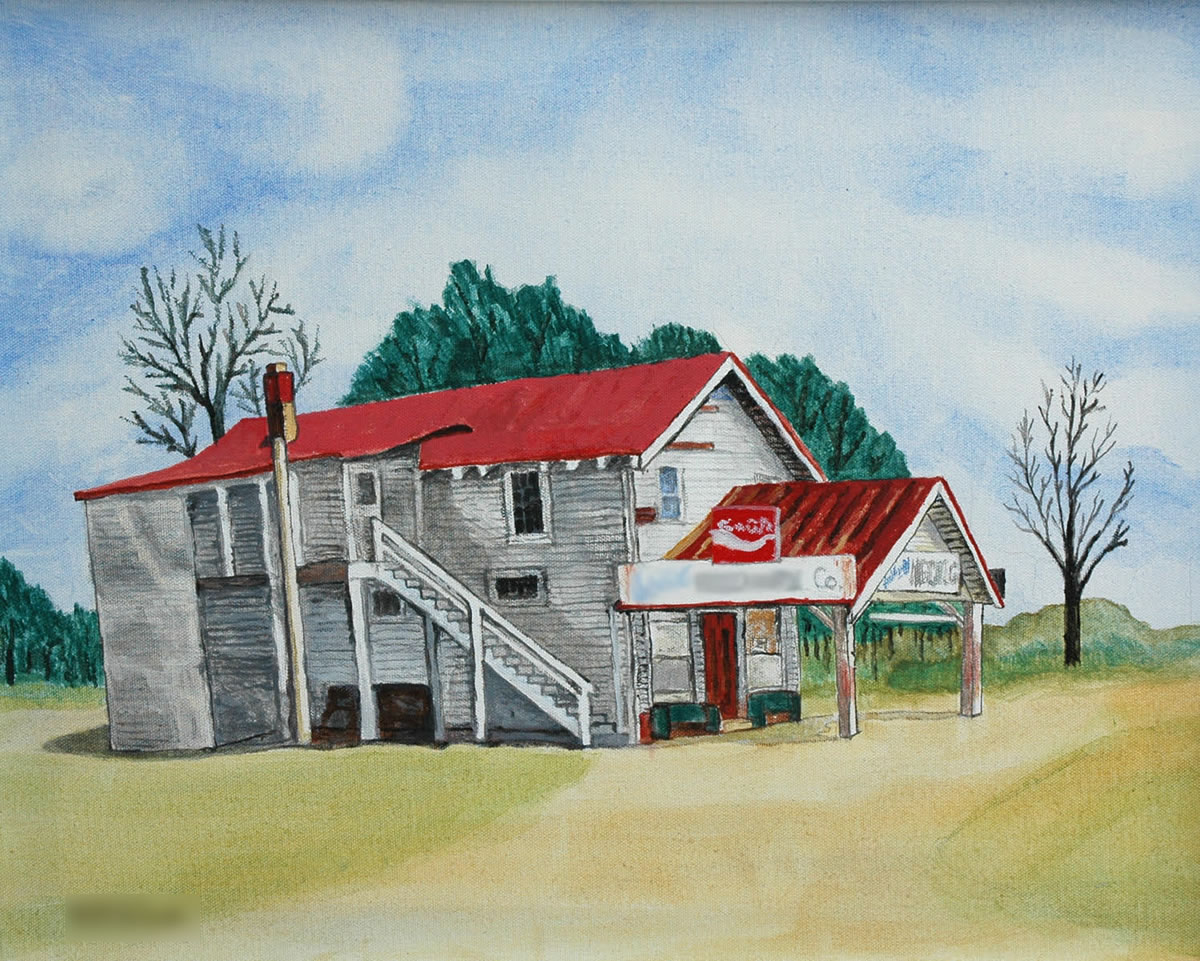INSIDE ISSUE 18.41 | OCT. 11, 2019
 BIG STORY: As local governments ban plastics, state encourages plastics
BIG STORY: As local governments ban plastics, state encourages plastics
NEWS BRIEFS: Senate panel to talk more Oct. 22 on early abortion ban
COMMENTARY, Brack: Be objective on Santee Cooper’s future
SPOTLIGHT: Riley Institute at Furman University
MY TURN, Palm: Whistleblowers, inspectors general and the common good
FEEDBACK: What are you thinking?
MYSTERY PHOTO: Painting of South Carolina scene
S.C. ENCYCLOPEDIA: Author Julia Peterkin
As local governments ban plastics, state encourages plastics

By Lindsay Street, Statehouse correspondent | State officials this week praised South Carolina’s developing role in moving plastic material from point A to point B. Meanwhile as local governments are trying to curb plastic waste, now they’re dealing with another real problem: environmental contamination by a spill of millions of tiny plastic pellets.
“Just one word … plastics,” Dustin Hoffman’s character was told in 1968’s The Graduate. “There’s a great future in plastics.” Now, 51 years later, South Carolina is caught in a war between more plastics and less.

S.C. Secretary of Commerce Bobby Hitt this week said he was “excited” by an Oct. 8 announcement for thousands of additional pounds of plastic material to come through the Port of Charleston. State Ports Authority CEO Jim Newsome called plastic transportation “a significant part” of the port’s growth strategy.
But downstream from the port’s headquarters on the Cooper River, Sullivan’s Island Mayor Pat O’Neil said he’s worried. The town’s single-use plastic ban appeared to curb litter. Then in July, a spill of plastic pellets from Frontier Logistics at the port traveled to its beaches. Despite cleanup efforts, pellets remain in the sand, the mayor said. Now, he said, he’s cautiously eyeing A&R Logistics’ announcement that it would export 132,000 tons of the pre-production plastic pellets, also known as nurdles.

“Industry is important (and) economic growth is important but we need to be selective and prudent in the types of industries we encourage,” O’Neil said.
Eighteen local governments have passed plastic bag bans, but there are few protections in place in the state from pre-production plastic. Frontier Logistics was found in violation of the state’s Pollution Control Act, although the act does not include any reference to plastic. According to a July 26 letter to the company, monetary penalties would follow should Frontier not attend remediation meetings with the S.C. Department of Health and Environmental Control (DHEC).
“Here we are doing everything we can to keep plastic out of the environment, and here are those nurdles,” said S.C. Sen. Sandy Senn, R-Charleston. She has pushed for the state legislature to vote against proposed statewide legislation that would prevent local governments from passing single-use plastic bans, which comes up perennially in Columbia. Senate Bill 394 may be one of the first items taken up in the 2020 legislative session.
Responsible transportation of plastic pellets is a “high priority” among environmental advocacy groups, according to Coastal Conservation League Land, Water and Wildlife Program Director Emily Cedzo.
“It’s a burgeoning business for South Carolina right now. The onus is on us to find the solutions,” she said. “Who are we responsible to? The public and environment or the plastics industry?”
But beyond whether the state should address single-use plastics bans for bags or straws or sporks, the legislature currently does not have any other plastic legislation on its agenda for the 2019-2020 session.
And in the meantime, the S.C. Department of Commerce and the S.C. State Ports Authority are working with plastic and logistics companies to locate or expand their presence in the state.
‘Relatively new’ market
For years, the State Ports Authority has encouraged for more plastic transporters like A&R and Frontier.
 “This market is relatively new for SCPA,” SCPA CEO Jim Newsome said in a statement to Statehouse Report. In 2017, the port saw 79,000 tons of pellets exported. In 2018, that amount grew by nearly three times: 226,000 tons of pellets.
“This market is relatively new for SCPA,” SCPA CEO Jim Newsome said in a statement to Statehouse Report. In 2017, the port saw 79,000 tons of pellets exported. In 2018, that amount grew by nearly three times: 226,000 tons of pellets.
“SCPA looks to grow retail cargo and synthetic resin cargo, among other business segments, in an effort to grow above market,” he said.
A&R Logistics will ship 12,000 containers (each containing roughly 11 tons of pellets) in its first year of operations in Berkeley County, where 60 jobs will be created in addition to a $60 million investment, according to Newsome.
In 2018, Frontier announced a $35.5 million investment and an additional 34 jobs created.
A&R Logistics and Frontier Logistics did not respond to requests for comments for this story. Neither company is currently receiving nor is slated to receive state-funded incentives offered through the Commerce Department, according to public records.
More state incentives
Just as the ports authority has sought more plastic exports, the state Commerce Department also has worked with companies in plastic industries at least 41 times since 2009. According to public records of a dozen federal industry classifications — including plastic material and resin manufacturing and plastic packaging — the state Commerce Department has awarded counties $850,000 of help with incentives and offered job development credits to support relocations or expansions for 16 companies. More than 1,200 jobs and $461,700,000 in investments were tied to those receiving state-level incentives.
The list, provided to Statehouse Report following a request through the state’s Freedom of Information Act, lacked transporting companies since they are not federally classified as plastic companies .
When asked what environmental considerations the port makes when recruiting industry, Newsome released this statement:
“The handling of plastics for export is a significant part of SCPA’s export growth strategy, with the understanding that it is handled by reputable companies with sound procedures.”
The S.C. Commerce Department also released a statement about environmental considerations:
“The Department of Commerce … does not recommend any project for approval to the Coordinating Council unless the county in which the project proposes to locate is in full support of the company and the proposed project.”
Policy considerations
When asked what the port can do to assure no further pellet spills, Newsome responded that the state’s environmental agency, DHEC, “serves an important role” for regulating industry in the state and that the port assisted in Frontier’s operational adjustments and improvements to its temporary site where the spill occurred.
- In major plastic-producing Texas, several pellet spills were reported in the last year. A lawsuit is seeking $184 million in penalties from Formosa Plastics for violating the Clean Water Act and its Texas Commission on Environmental Quality permit.

Senn said she doesn’t want additional state regulations, and echoed Newsome on the importance of plastic pellets to the state.
“I doubt anyone is going to tell (transporters) not to come because it’s one of the few things we get a leg up on China … They buy those plastic pellets from us,” Senn said. She added, “But (the companies have) got to be more responsible.”
The problem of plastic pellets is not new. In 1993, the U.S. Environmental Protection Agency released a report that offered recommendations to avoid environmental contamination. The Clinton-era report focused mostly on industry standards, not governmental regulation. One of the recommendations was for better packaging that is less prone to puncturing in transport.
Senn said that is what she would like to see done in the wake of Frontier’s spill.
California is one of the few states that has a law addressing pre-production plastic materials. Operated through the state’s water board, any company that manufactures, transports or warehouses plastic pellets will have state regulation and inspections.

S.C. Rep. Wendell Gilliard, D-Charleston, is pushing for a statewide ban on single-use plastics in 2020. He said “bold leadership” will be necessary to curb potential pre-production plastic pollution from industry.
“People better know how to cross the T’s and dot the I’s because (pollution is) happening,” Gilliard said. “It’s gotten to the point now if we don’t do something then it’s going to be too late to do anything … It can’t be all about money you know.”
Sullivans Island’s O’Neil said the impossible nature of cleaning up a pellet spill makes him fear a repeat incident.
“We need absolute assurances that those transfers (of pellets) will not permit the release into those waters,” he said. “There is no getting rid of them.”
- Have a comment? Send to: feedback@statehousereport.com
NEWS BRIEFS
Senate panel to talk more Oct. 22 on early abortion ban
By Lindsay Street, Statehouse correspondent | A Senate panel is set to continue its review of a House bill that would ban most abortions after six weeks of pregnancy with a meeting.
![]() The Senate Medical Affairs subcommittee will convene 10 a.m. Oct. 22 is room 308 of the Gressette building at the Statehouse in Columbia. See the agenda here.
The Senate Medical Affairs subcommittee will convene 10 a.m. Oct. 22 is room 308 of the Gressette building at the Statehouse in Columbia. See the agenda here.
House bill 3020 proposes requiring testing for a detectable heartbeat in a fetus prior to an abortion. If a heartbeat is detected — which can occur as soon as four weeks after conception — then an abortion would not be permitted under the proposed legislation. The bill would establish criminal and civil penalties. Since 2013, nine states — including Georgia — have adopted similar legislation. Laws in some states have been temporarily blocked, but a legal challenge is looming for the U.S. Supreme Court.
- When do most women find out they are pregnant? Usually after the first missed period, which is about four weeks after conception. Read more via The New York Times.
In 2016, then-Gov. Nikki Haley signed into law a ban on abortions after 20 weeks of pregnancy with no exceptions for rape or incest.
The House passed the proposed stricter law 64-22 prior to the 2019 break in the two-year legislative session. The battle over H.B. 3020 is expected to hit the Senate once the legislature reconvenes in January.
In other news:
Education Oversight Committee talks report cards Oct. 14. The state Education Oversight Committee will review the 2019 school and district report cards released earlier this month during its 1 p.m. Oct. 14 meeting in room 433 of the Blatt building at the Statehouse in Columbia. See the report cards here. | Meeting agenda.
Three meetings seek child welfare input. The Joint Citizens and Legislative Committee on Children will hold three final public input meetings this month. Testimony will be taken from members of the public on any issue dealing with children in the state. Meetings are: 5 p.m. Oct. 15 at Trident Technical College in North Charleston, and 10 a.m. and 5 p.m. Oct. 22 in room 105 of the Gressette building at the Statehouse in Columbia.
Related: 130,000 children live in high poverty areas in South Carolina.
Judge could decide on GOP primary Oct. 18. The attorneys suing over the S.C. Republican Party’s decision not to hold a 2020 presidential preference primary have filed a request for S.C. Circuit Court Judge Jocelyn Newman of Columbia to order a primary held in February. A hearing on the motion is scheduled for 10 a.m. Oct. 18 in Columbia.
Commerce comes under scrutiny. The S.C. Department of Commerce, tasked with luring companies and their jobs to the state, has come under scrutiny this week after a state senator has filed a lawsuit over public records. S.C. Sen. Dick Harpootlian, D-Richland, said he wants to force the agency to be more transparent in how it doles out state incentives and he called for an end to the “cult of secrecy.” Records from Commerce show the agency was aware of a tire maker’s unpaid debts and still worked toward finalizing state incentives. The Nerve also rehashed an older story this week, where it looked at the department’s “long history of secrecy.” Commerce Secretary Bobby Hitt has said the department is transparent in its transactions.
Rural Women’s Summit set for Oct. 27-29 in Greenville. The summit is designed for rural leaders and advocates of women’s leadership roles and their barriers in rural America. Learn more.
2020 candidate calendar
 Throughout the campaign season, we are working to keep South Carolina informed of candidate events in the state. Have an event you want us to know about? Email us at 2020news@statehousereport.com.
Throughout the campaign season, we are working to keep South Carolina informed of candidate events in the state. Have an event you want us to know about? Email us at 2020news@statehousereport.com.
Harris visits Midlands Oct. 18-20. Democratic presidential hopeful and California Sen. Kamala Harris returns to South Carolina next week for her 12th visit. Events include: Orangeburg County Democratic Party 6:30 p.m. Oct. 18 at Orangeburg County Fairgrounds in Orangeburg; S.C. State Homecoming 11:30 a.m. Oct. 19 at S.C. State University in Orangeburg; a town hall 4:45 p.m. Oct. 19 at Aiken County Town Hall in Aiken; and church services 8 a.m. Oct. 20 at Brookland Baptist Church in West Columbia.
- Have a comment? Send to: feedback@statehousereport.com.
BRACK: Be objective on Santee Cooper’s future

By Andy Brack, editor and publisher | State legislators need to be a little bit like reporters in the days ahead as they consider the fate of Santee Cooper, the state-backed utility that fell into trouble when a project to build new nuclear reactors spectacularly died.
 In 2020 as lawmakers consider the future of the utility, its power plants, its lakes and its prowess in economic development in our poor state, they need to be more objective. They need to look at Santee Cooper’s fate from all sides and impacts, instead of rushing to political judgment that ignores fiscal common sense and opportunity costs. In other words, they don’t need to sell when the price may be low. Might it not be better to fix whatever went wrong and hold on to the asset until it has more value?
In 2020 as lawmakers consider the future of the utility, its power plants, its lakes and its prowess in economic development in our poor state, they need to be more objective. They need to look at Santee Cooper’s fate from all sides and impacts, instead of rushing to political judgment that ignores fiscal common sense and opportunity costs. In other words, they don’t need to sell when the price may be low. Might it not be better to fix whatever went wrong and hold on to the asset until it has more value?
The $9 billion failure in 2017 of the nuclear project between the minority partner, Santee Cooper, and its privately-held partner, SCE&G, led to lots of public angst — and rightfully so. In the end, SCE&G was sold to Dominion Energy and a pack of state officials have had their sights on dumping Santee Cooper or turning over its management to someone else.
With public trust in Santee Cooper at a low, many at the Statehouse have seemed eager to move on as corporate hawks have dumped hundreds of thousands of dollars into lobbying efforts to get a crack at owning or running Santee Cooper. Do you think they’d be circling like buzzards if they thought Santee Cooper and its assets were not worth it? Maybe a better course would be to let the utility right its own leaky ship with a new approach to deal with what it characterizes as “challenging issues facing our company.”
Since mid-2018, records show Dominion, which brokered a deal to buy SCE&G, spent more than $400,000 on 15 lobbyists at the Statehouse and tens of thousands of dollars in contributions to politicians and political caucuses. Not to be outdone, NextEra Energy, a Fortune 200 energy company also interested in gobbling Santee Cooper, spent more than $150,000 on Statehouse political donations and $500,000 in donations to federal politicians, caucuses and political action committees. And it has paid almost $150,000 to 10 lobbyists at the Statehouse.
By the end of the 2018 session, Santee Cooper’s future was uncertain, but it seemed to weather the hullabaloo, even though state law kept it from advocating for or against privatization. As the 2019 legislative session opened, cooler heads seemed to prevail as the utility started to make some reforms, including hiring of a seasoned new chief executive. In June, the General Assembly passed a law requiring a cold, hard look at what’s ahead for the utility — whether it should be sold, managed by another company or reformed internally.
 In recent weeks, the gray lady of Santee Cooper seemed to wake up, unveiling a bold reform plan that includes paying down debt more quickly without rate increases, preserving energy reliability, reducing carbon emissions and increasing use of renewable solar energy by 1,000 megawatts, which is the equivalent of two medium power plants. Boosting solar, for example, could lead to 10,000 acres of solar fields. Other reforms call for closing four coal-fired generating units over eight years, boosting natural gas generation, introducing a large-scale battery storage facility to hold power for peak times and being more frugal with costs of staffing, which has been reduced 10 percent since the whole mess started in 2017.
In recent weeks, the gray lady of Santee Cooper seemed to wake up, unveiling a bold reform plan that includes paying down debt more quickly without rate increases, preserving energy reliability, reducing carbon emissions and increasing use of renewable solar energy by 1,000 megawatts, which is the equivalent of two medium power plants. Boosting solar, for example, could lead to 10,000 acres of solar fields. Other reforms call for closing four coal-fired generating units over eight years, boosting natural gas generation, introducing a large-scale battery storage facility to hold power for peak times and being more frugal with costs of staffing, which has been reduced 10 percent since the whole mess started in 2017.
In recent days, at least three companies interested in buying or managing Santee Cooper have been briefed on Santee Cooper’s long-term business forecast so they can craft their bids. In November, all three and Santee Cooper are to give plans confidentially to the state Department of Administration for evaluation. It will make recommendations to lawmakers in January.
When that time comes, state legislators need to set aside preconceived notions. They need to ignore the millions of dollars spent to influence them. And they need to do right by the taxpayers of South Carolina by objectively considering what’s best for the state. Have open, not closed, minds on Santee Cooper’s future. To do less is to fail.
Andy Brack’s latest book, “We Can Do Better, South Carolina,” is now available in paperback and for Kindle via Amazon.
- Have a comment? Send to: feedback@statehousereport.com.
Riley Institute at Furman University
 The public spiritedness of our underwriters allows us to bring Statehouse Report to you at no cost. This week’s spotlighted underwriter is Furman University’s Riley Institute, which broadens student and community perspectives about issues critical to South Carolina’s progress. It builds and engages present and future leaders, creates and shares data-supported information about the state’s core challenges, and links the leadership body to sustainable solutions.
The public spiritedness of our underwriters allows us to bring Statehouse Report to you at no cost. This week’s spotlighted underwriter is Furman University’s Riley Institute, which broadens student and community perspectives about issues critical to South Carolina’s progress. It builds and engages present and future leaders, creates and shares data-supported information about the state’s core challenges, and links the leadership body to sustainable solutions.
Launched in 1999, the Institute is named for former South Carolina Governor and former United States Secretary of Education Richard W. (Dick) Riley. It is committed to nonpartisanship in all it does and to a rhetoric-free, facts-based approach to change.
- Learn more about the Riley Institute.
- Also learn more about the Riley Institute’s Center for Education Policy and
- Leadership.
PALM: Whistleblowers, inspectors general and the common good

By Fred Palm, contributing editor | The role of a government inspector general is much in the news lately. The position has evolved from military tradition to ensure that government-funded entities use taxpayer money in careful, frugal and legal manners. We don’t want, for example, our hard-earned tax dollars wasted, ripped-off, squandered, thieved or frauded.
 The inspector general was first used here during our Revolutionary War. General George Washington smartly recognized that his militia leaders and those that reported to them sometimes distorted, exaggerated and plain lied about their fitness and capabilities.
The inspector general was first used here during our Revolutionary War. General George Washington smartly recognized that his militia leaders and those that reported to them sometimes distorted, exaggerated and plain lied about their fitness and capabilities.
Washington appointed an inspector general modeling a practice of the Prussian Army, then the world’s elite war-fighting army. Back then, one of the practices of the Prussian Army was to require field inspections for war-fighting fitness to be conducted by knowledgeable staff who were independent and outside the reporting chain of command. They were intentionally free from the obligation to follow orders.
Washington and his command staff used an inspector general to provide a potential pathway for the truth. The obligation of Washington’s inspectional forces was to objectively determine capability and to accurately report on the conditions and recommend actions needed to cure the defects found so future battle would be won. It was not about “gotcha,” blaming or looking back.
 Over time, inspectors general evolved in our governments as an added layer of protection. In addition to having inspector generals to monitor the capabilities and ethical standards of officials, taxpayers are protected through whistleblowers who potentially bring forward a claim or charge of wrongdoing, unethical or illegal acts found in the government sphere. They also might also bring forward claims to settle scores because a boss did not approve an expected raise, took too long of a lunch hour or some other trite, ill-founded or misperceived event.
Over time, inspectors general evolved in our governments as an added layer of protection. In addition to having inspector generals to monitor the capabilities and ethical standards of officials, taxpayers are protected through whistleblowers who potentially bring forward a claim or charge of wrongdoing, unethical or illegal acts found in the government sphere. They also might also bring forward claims to settle scores because a boss did not approve an expected raise, took too long of a lunch hour or some other trite, ill-founded or misperceived event.
Are whistleblowers blabbermouth, spies, informers, snitches, stoolies, malcontents, tattlers, rebels, “rats” or simply just negative people who are the saboteurs of organizations? In fact, they can be considered in another way — as truth-tellers, heroes, courageous, corruption-busters, fraud-fighters, champions of the good or just doing what is right. Any one of the labels might be a good fit depending on the facts and circumstances. If you have met one, you have met just that one, as they come in all forms that needs to be revealed.
The validity and accuracy of any whistleblower complaint can be determined by the responsible elected and appointed personnel in the chain of command who are the first to consider its validity. As Washington found, at times the right thing is not done because it is an embarrassment, worthy of concealment or cover up or worse. Whistleblowers have a path outside of the reporting structure. In our civilian government and our U.S. military commands, that path is to the inspector general who focuses on the mission. Inspectors general need reports from multiple sources to do their job to make accurate recommendations to management.
Inspectors general need to separate fact from fiction from a whistleblower’s report to bring forward facts or events in need of management’s attention and any suggested improvements that are needed to achieve higher levels of performance, cure corruption and better serve the taxpayers. The compelling need is to find out the elusive truth. An inspector general’s challenge is to balance these competing needs providing a path forward for the common good.
Fred Palm of Edisto Island is a retired professor of oversight and investigations at the John Jay College School of Public Management and a former executive director of the Association of Inspectors General. He writes about the Common Good for our sister publication, Charleston Currents.
- Have a comment? Send to: feedback@statehousereport.com.
Send us your thoughts … or rants
We love hearing from our readers and encourage you to share your opinions. But you’ve got to provide us with contact information so we can verify your letters. Letters to the editor are published weekly. We reserve the right to edit for length and clarity. Comments are limited to 250 words or less. Please include your name and contact information.
- Send your letters or comments to: feedback@statehousereport.com.
Painting of South Carolina scene

A reader sent in this image of a painting by his father of a South Carolina scene you may recognize. (We’ve altered it a little to remove the name on a sign and the painter’s name.) Where is it and what is it? Send your guess about the location of this photo to feedback@statehousereport.com. And don’t forget to include your name and the town in which you live.
Our previous Mystery Photo
 Our Oct. 4 mystery, “Interesting pattern, tough mystery,” shows the “acoustically near perfect” ceiling of Francis Marion University’s performing arts center in downtown Florence. Thanks to reader Bud Ferillo for sharing the photo.
Our Oct. 4 mystery, “Interesting pattern, tough mystery,” shows the “acoustically near perfect” ceiling of Francis Marion University’s performing arts center in downtown Florence. Thanks to reader Bud Ferillo for sharing the photo.
And kudos to those who identified it, including George Graf of Palmyra, Va.; Will Bradley of Las Vegas, Nevada; Barry Wingard and Jacie Godfrey, both of Florence; David Taylor of Darlington; and Frank Bouknight of Summerville.
Graf provided, as often is the case, some more context: “According to theatrecc.com, Francis Marion University, in partnership with the city of Florence, constructed a new center to house its performing and fine arts programs. Designed to accommodate a range of performance types, the 850-seat mainstage employs a custom acoustic shell which rolls in on a gantry from rear stage storage – converting the theatre into a concert hall in a matter of minutes. An academic wing offers rehearsal and performance spaces, recording and sound reinforcement facilities, faculty offices, and a music technology lab.”
- Send us a mystery: If you have a photo that you believe will stump readers, send it along (but make sure to tell us what it is because it may stump us too!) Send to: feedback@statehousereport.com and mark it as a photo submission. Thanks.
S.C. ENCYCLOPEDIA
HISTORY: Author Julia Peterkin

S.C. Encyclopedia | Pulitzer Prize-winning author Julia Peterkin was born on October 31, 1880, in Laurens County, the youngest daughter of Julius Mood, a schoolteacher, and his wife, Alma Archer. Julius Mood went on to become a doctor and to practice medicine in Sumter. Alma Mood died of tuberculosis when Peterkin was eighteen months old, and Julius Mood soon remarried. Peterkin was sent to live with her paternal grandparents, while her older sisters stayed with their father and his new wife. The loss of her mother and the sense that she had been “given away” would later become a haunting refrain in Peterkin’s fiction.
Peterkin graduated from Converse College in 1896 and went on to earn a master’s degree from Converse a year later. She taught in a one-room school in Fort Motte; married the cotton planter William George Peterkin on June 3, 1903; and moved to Lang Syne Plantation near St. Matthews, where she would live for the rest of her life. Peterkin had one son, William George Peterkin, Jr., and spent the first twenty years of her marriage trying to fill the archaic role of plantation mistress.
Peterkin did not begin to write until she was forty years old. She began by telling tales of plantation life to her piano teacher, Henry Bellamann, a poet with literary leanings who encouraged her to write them down. Ambition soon led her to approach famous writers and critics, notably Joel Spingarn, Carl Sandburg, and H. L. Mencken, even while secretly taking a correspondence course on magazine writing. Her stories found a home in Emily Clark’s new magazine the Reviewer and in Mencken’s more widely read Smart Set. Within two years Peterkin had contracted to publish a book with Alfred A. Knopf, then just beginning to establish a distinguished reputation. The result was Green Thursday (1924), a collection of linked short stories about a black farm laborer named Killdee; his wife, Rose; and their foster daughter, Missie. Peterkin drew on what she knew about the lives of real people at Lang Syne, rendering some of them so acutely that the portraits are recognizable to their descendants. Yet the emotional force of many of the tales comes from her own life experience, especially the trauma of losing her mother and growing up apart from her father.
Peterkin’s stark, poignant stories about black country folk were among the first flowerings in the movement toward ironic, realistic regional fiction later known as the Southern Renaissance. In 1929 she became the first southern writer to win the Pulitzer Prize for fiction, for the novel Scarlet Sister Mary (1928). Two of her books, Black April (1927) and Scarlet Sister Mary, became best-sellers, and her last, Roll, Jordan, Roll (1933), with photographs by her friend Doris Ulmann, was one of the groundbreaking documentaries of the 1930s.
White southerners found Peterkin’s early stories offensive and considered her a traitor to her race, though their animosity faded as her celebrity grew. Her mature work gained international fame and was unlike anything that had come before it. Peterkin had the gift of luring mainstream white audiences into what was to them a strange new world: the community of black farmworkers who lived by traditions that were largely African in origin. Whites seldom appear in her work, except in trivial roles.
Peterkin had a great ear for language and eventually worked out a literary rendering of the difficult Gullah dialect that was true to the cadences and flavor of the original but understandable to ordinary Americans. Her novels were considered racy and subversive, partly for their frank celebration of sex but also because they dared to reveal hard truths about how blacks were forced to live in the Jim Crow South. Taken together, Green Thursday, Black April, Scarlet Sister Mary, and Bright Skin (1932) chronicle the decline of the plantation economy and the wrenching personal and social forces that drove African Americans to leave the rural South.
Peterkin’s stories won high praise from black writers and scholars associated with the Harlem Renaissance, including W. E. B. Du Bois, Walter White, Alain Locke, and Countee Cullen. African American novelists who emerged soon after, including Zora Neale Hurston, show clear signs of Peterkin’s influence. During the Depression, Peterkin’s fiction fell out of fashion, and it was largely ignored during the 1970s and 1980s, when the works of many other women writers were resurrected and appreciated. Yet her best work has the timeless quality of great literature and seems as fresh and vibrant in the twenty-first century as it did in the 1920s.
Peterkin died in Orangeburg on August 10, 1961, of congestive heart failure. She was buried in the family plot across the street from the Episcopal Church near Fort Motte. In 1988, Peterkin was posthumously inducted into the South Carolina Academy of Authors.
— Excerpted from an entry by Susan Millar Williams. This entry may not have been updated since 2006. To read more about this or 2,000 other entries about South Carolina, check out The South Carolina Encyclopedia, published in 2006 by USC Press. (Information used by permission.)
ABOUT STATEHOUSE REPORT
Statehouse Report, founded in 2001 as a weekly legislative forecast that informs readers about what is going to happen in South Carolina politics and policy, is provided to you at no charge every Friday.
Meet our team
- Editor and publisher: Andy Brack, 843.670.3996
- Statehouse correspondent: Lindsay Street
Buy the book
Now you can get a copy of editor and publisher Andy Brack’s We Can Do Better, South Carolina! ($14.99) as a paperback or as a Kindle book ($7.99). . The book of essays offers incisive commentaries by editor and publisher Andy Brack on the American South, the common good, vexing problems for the Palmetto State and interesting South Carolina leaders.
More
- Mailing address: Send inquiries by mail to: P.O. Box 22261, Charleston, SC 29407
- Subscriptions are free: Click to subscribe.
- We hope you’ll keep receiving the great news and information from Statehouse Report, but if you need to unsubscribe, go to the bottom of the weekly email issue and follow the instructions.
- © 2019, Statehouse Report. All rights reserved.
















 We Can Do Better, South Carolina!
We Can Do Better, South Carolina!